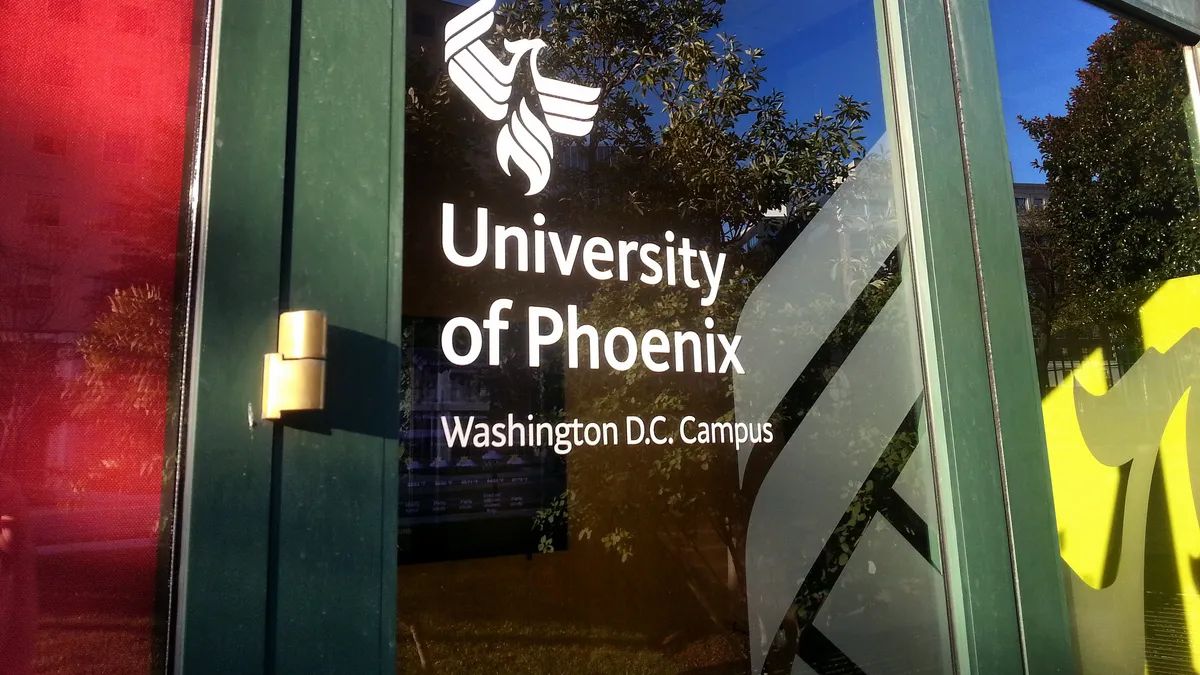Dive Brief:
-
The University of Phoenix and its parent company, Apollo Education Group, agreed Tuesday to a $191 million settlement in a lawsuit brought by the Federal Trade Commission (FTC) accusing the for-profit chain of misrepresenting its ties with employers.
-
The lawsuit alleged that the university created deceptive ads featuring major employers — including Adobe, Microsoft and Twitter — that led students to believe the companies had worked with the university to create job opportunities for its graduates.
-
These ads targeted veterans and their families, as well as Hispanic students, the lawsuit alleged. As part of the settlement, the university will pay the FTC $50 million in cash and cancel $141 million in student debt.
Dive Insight:
The settlement comes as the U of Phoenix has struggled to shed a reputation tainted by years of accusations that it encourages students to take out loans for an education that leaves them with few lucrative career prospects.
In the past few years, the chain's enrollment has plummeted from a high of more than 470,000 students in 2010 to around 95,000 in the fall of 2018. The university did not provide updated enrollment figures in an emailed request sent by Education Dive on Tuesday.
In a statement posted on its website, the university said it "continues to believe it has acted appropriately and has admitted no wrongdoing." The ads in question, which ran between 2012 and 2014, were developed under previous leadership, the statement notes.
Apollo Education Group agreed in 2017 to be acquired by a group of investors in a $1.1 billion deal that took private the publicly traded company. At the time, the new owners said the change would help the university focus on improving student outcomes.
Since then, the chain has struggled to find its footing as regulation and public scrutiny of for-profit colleges has grown and competition for online students has heated up. Growth in online enrollment has recently pushed some universities — including Western Governors and Arizona State — past the 100,000-student mark.
This settlement won't help the U of Pheonix heal its reputation and attract new students, even if the allegations pertain to ads run several years ago, said Phil Hill, an ed tech consultant with the firm MindWires. "They sort of personify the excesses of the for-profit sector," he said. "They really have what I would say is a 'toxic brand.'"
Other for-profits have recently found themselves in similar situations. Earlier this year, for-profit college operator Career Education Corp. agreed to settle a five-year investigation brought by 49 attorneys general over its marketing and recruitment practices.
And last November, a federal judge approved a settlement that forgave nearly $600 million in student debt owed to the now-defunct ITT Technical Institute. The lawsuit against the former chain alleged it mischaracterized loans as grants.
To seek cover, some for-profit operators are attempting to convert their colleges to nonprofits and, in a few cases, establish themselves as educational services companies. But recent actions taken by the U.S. Department of Education suggest this may not be a sure path forward.
One example comes from the department's decision to continue to regard Grand Canyon University as a for-profit college for the purposes of accessing Title IV funding. The IRS and the university's accreditor had already signed off on Grand Canyon's decision to spin off the university as a nonprofit that would contract with the for-profit, publicly traded Grand Canyon Education (GCE) for a host of services in exchange for 60% of the school's revenue from tuition and other sources.
The department said in a letter last month that it reached its decision because, among other reasons, the services agreement struck between the university and GCE was designed primarily "to drive shareholder value for GCE with (the university) as its captive client — potentially in perpetuity." The university plans to contest the decision. So although the IRS gave the green light for the university to be a nonprofit, the department has said it cannot advertise itself as such.











